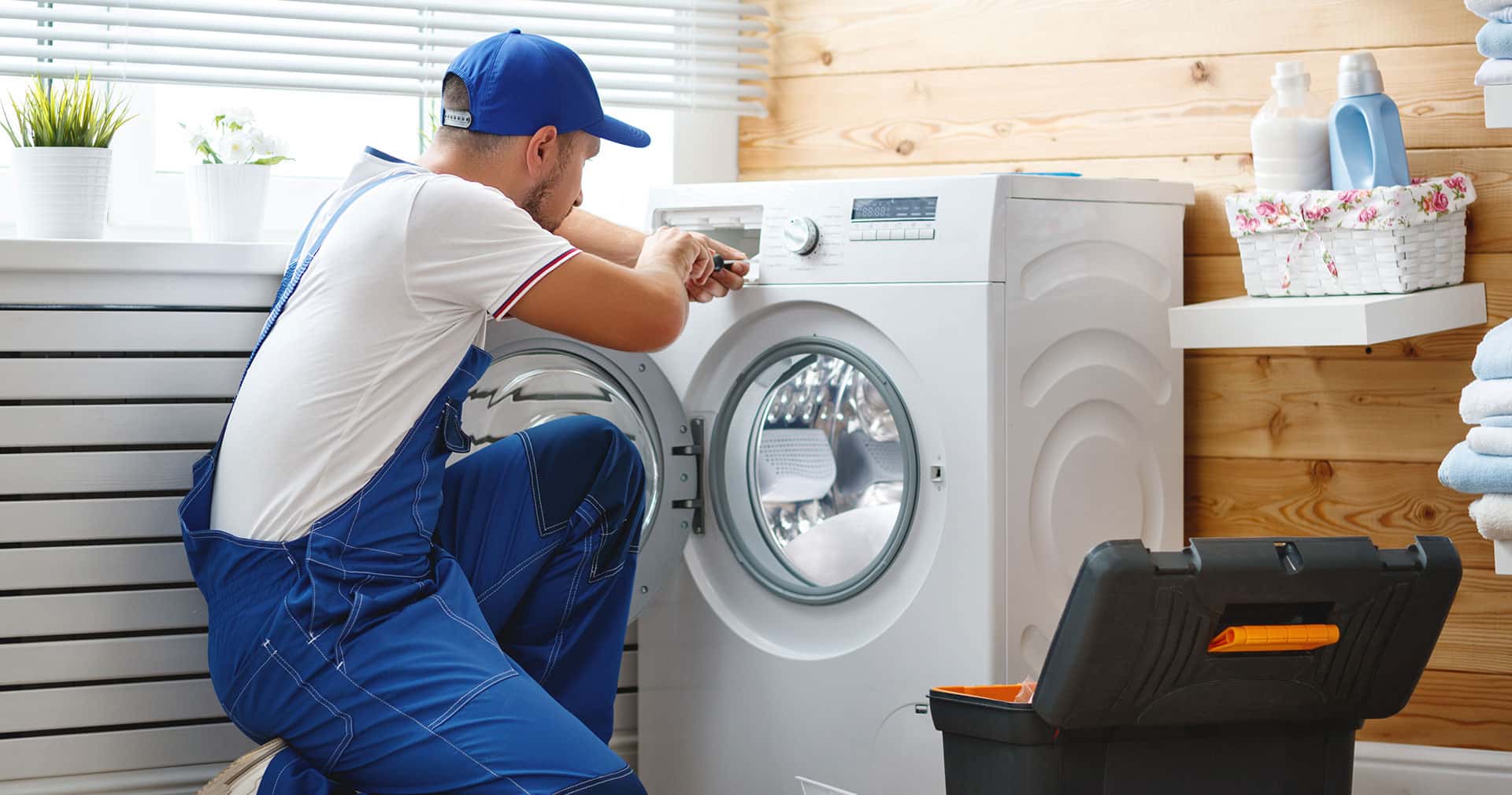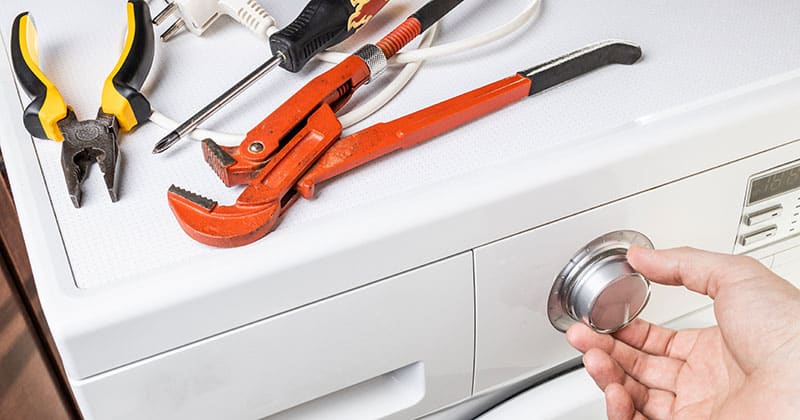
Appliance repair is a stable profession with even greater opportunities for growth in the future. If you’ve wondered how to become an appliance repair technician, this post is for you.
Learn more about the predicted trajectory of this career. Get the 7 essential steps to enter the field, as well as salary information about the appliance repair industry.
We’ll wrap up with practical tips you can use right away to begin your appliance repair journey.
The Daily Work of an Appliance Repair Technician
Appliance repair technicians fix, install, and adjust appliances for homeowners and businesses. Occasionally, this work is performed in a central location, like a repair shop. But it mostly involves traveling to the home or business to do repairs on-site.
People in this profession can choose from multiple specialties, such as general appliance repair or electronics repair.
Certification is required for certain specialties, which we’ll discuss in more detail below.
What’s a typical day like for an appliance repair technician?
Usually, you’ll have a list of repair or installation orders each day from people who have called ahead to schedule appointments. For instance, you might install a washer and dryer first thing in the morning.
Then you fix an electric stove before lunch. You finish up the day by doing maintenance in the laundry room in an apartment complex for a property management company.
You may also have to squeeze in some emergency calls. For example, a customer might call you because their washing machine is leaking water all over the basement and causing damage.
If you work for an appliance repair company, you’ll likely be dispatched by the owner or someone who handles appointments. Many businesses today use service business software to assist with this.
Larger companies try to work as efficiently as possible by scheduling each technician in a certain geographic area. This minimizes downtime and travel expenses for greater profitability.
You might go into business for yourself. In that case, you have more leeway with scheduling. But you’ll still want to shoot for the most efficient routing possible. You may also schedule jobs around picking up parts. Or you might be working with other contractors like electricians, plumbers, and remodelers.
FROM ONE OF OUR PARTNERS: The 6 Best Field Service Management Software Options
Outlook for the Appliance Repair Industry
You might be pleasantly surprised to know that the outlook for the appliance repair industry is positive. In fact, many areas are experiencing a shortage of workers in this field.
Starting in the 1990s, American high school students were encouraged to pursue four-year degrees. Education was focused on careers outside construction and the trade industries. That resulted in a deficit of repair technicians that has persisted today.
These statistics about opportunities and industry growth are quite promising:
- Job growth rate is projected at 8% from 2018 to 2028.
- The above figure represents over 17,000 new jobs.
- Over the last five years, salaries in this field have increased 11%.
- There are over 70,000 job openings currently in the USA.
You can read more about appliance repair technician earning potential in the next section.

Earning Potential of Appliance Repair Technicians
The specialty you choose is one factor that affects your salary as an appliance repair technician. The more specialty training and certification you receive, the greater your earning potential.
Installing and repairing appliances has become a more skilled profession in the last decade or so. This is because more appliances use complex internal computer systems or may be connected to the Internet of Things (IoT). Being well educated in these areas can command a higher salary.
Other factors that influence earnings include:
- Geographic location by state and city
- Years of experience
- Type and size of employer
- Union membership and collective bargaining
Being self-employed and owning your own business also affects how much income you can bring in. On the one hand, you have to cover your business expenses, like:
- Office and/or vehicle
- Payroll for staff and employees
- Equipment and tools
- Insurance and licensing
- Miscellaneous fees
But if you have a large enough client base, you can pay those costs and still make a nice profit. Even better, you can expand your business once you have experience and a stable roster of customers. Theoretically, your profits are unlimited.
Let’s talk a little more about how location affects your earnings.
In general, locations with a higher cost of living offer better salaries for appliance repair technicians. According to ZipRecruiter, the average salary across the United States is $48,621. That includes more experienced technicians and those who are just starting out.
Alaska is the highest-paying state, with an average of $53,077 per year or $25.52 per hour. This is probably influenced by the state’s remote location and a higher demand for repair technicians.
Florida is the lowest-paying state. The average salary is $33,156 per year or $15.94 per hour.
That hourly rate is below the minimum wage in California. There, appliance repair technicians average $44,919 annually or $21.60 per hour. So, state minimum wage laws are also a factor.
These states round out the top 10 highest salaries for appliance repair technicians after Alaska:
- Oregon
- North Dakota
- Massachusetts
- Washington
- Hawaii
- Nevada
- Colorado
- South Dakota
- Iowa
Which states are in the bottom 10 above Florida?
- West Virginia
- Louisiana
- Georgia
- Arkansas
- Tennessee
- Alabama
- Montana
- Arizona
- Michigan
Are you beginning your career as an appliance repair technician? It may pay to move to a state with higher salaries if that’s feasible for you.
RELATED ARTICLE: How to Become an Appliance Repair Technician

7 Steps to Become an Appliance Repair Technician
Becoming an appliance repair technician is achievable for most people. The key is approaching the process methodically and knowing what’s required for your area of interest. Here are the steps you need to take to enter this career:
Decide Which Specialty Interests You
You may wish to be a general appliance technician or enter a niche field. Which appeals to you more?
On the one hand, you may see more variety in your day-to-day work as a general technician. And if you intend to work in a rural area, you may need to be more of a generalist to meet customer demand.
On the other hand, specialists who work in unique areas usually earn a little more. That’s because more training and experience is required. It takes more to get started, but it’s an investment.
You might also have a passion for a certain type of appliance repair. If you enjoy washing machine repair, becoming LG Certified or Whirlpool Certified is a great move.
Or maybe you know employers in your area are keen to hire some specialties. You want to know the jobs are there once you finish training and certification.
One more question: would you rather work in domestic or commercial appliance repair? Industrial appliances are often different from their home counterparts. Do you want to work in commercial refrigerator repair, for example? You should be ready to handle the kinds of fridges you’ll find in commercial kitchens.
Obtain the Required Education and Training
To start, you’ll need at least a high school diploma. If you don’t have one, you should get your GED (a high school equivalency diploma).
Vocational training comes next. Which program or programs you choose will depend on what’s available in your town and what type of work you want to do.
Some of the most popular curricula include:
Appliance Repair Vocational Training
This is a general diagnostics and repair program found in many technical schools.
Electronics Training
This is training in the analysis and repair of circuits related to appliances. It includes wiring diagrams and electrical schematics.
Many appliance repair technicians add training in areas like plumbing. This makes them more marketable. It also usually helps when it comes to earning more money.
Check Certification and Licensing Requirements, as Needed
You may need official certification or licensing, depending on your:
- Area of specialty
- State laws
- Municipal regulations
In California, for instance, you need a license to be an appliance repair technician anywhere in the state. This involves:
- Completing a training course
- Working under a licensed technician
- Providing proof of insurance and bonding
- Passing a background check
- Passing a written exam
- Submitting an application
- Paying the application fee
Conversely, Florida has no such statewide requirement. However, some municipalities have their own unique licensing laws. Therefore, you need to check with your state and local governments to see what laws govern your work.
Gain Field Experience
Say your state doesn’t require appliance repair experience for a license. It’s still smart to get as much as you can under your belt.
How do you do that? There are several paths you can take:
- Internships during appliance repair training
- Apprenticeships with experienced repair companies
- Getting hired as an entry-level employee and working your way up
The last two above are very similar. However, an apprenticeship is typically a more formal agreement where you agree to stay with the company in return for training.
Your school may have an alumni association or partnership program to help you connect with opportunities. Other ways to find openings include:
- Appliance repair technician union or trade association
- Online advertisements posted by local companies
- Word of mouth via local appliance repair businesses
Make Sure You’re Able to Drive Legally
You need to be able to drive for most appliance repair technician jobs. So, you’ll need a valid driver’s license for your state.
You will also be required to have a clean driving record. If there’s any question about this, your state Department of Motor Vehicles can check your record for you.
Don’t rack up any points or moving violations if you intend to stay employed in this field. Whether you work for yourself or someone else, you’ll need to be able to drive to your clients’ job sites.
Participate in Continuing Education
Appliance repair is constantly changing to keep up with the latest technology. The most successful appliance repair technicians at all levels share one thing. They stay current with new trends via continuing education.
Some growing trends in appliance repair include:
- Environmentally friendly refrigerant options
- Remote diagnostics using camera and video input
- Appliance integration with automated systems
- Smart appliances and the IoT
- Augmented reality assistance on repair jobs
There are conferences and classes you can take. And there are also thousands of DIY learning experiences online nowadays. These walk you through new appliance models and repair techniques.
Enhance Your Business Skills
No matter how great your appliance repair skills are, it helps to have solid business skills, too. These include:
- Marketing and sales
- Customer relations
- Billing and accounting
- Mobile technology
- Appliance repair business software
You can be an asset to your employer by understanding how to improve customer satisfaction. And these skills will help you be more profitable when running your own shop.
RELATED ARTICLE: Appliance Repair Invoice Template + 7 Invoicing Tips and Tricks
Appliance Repair: Where to Start
Ready to get started on the journey to become an appliance repair technician? Here are some final expert tips for the best possible outcome:
- In looking for the best training program, ask local companies with good reputations where their techs are trained. Find out if there is a waiting list to enroll so you can sign up as soon as possible.
- You want to train or apprentice with the highest-quality companies in your area. How do you know who they are? Read Google and Yelp reviews online for your city. Or go to your community’s Facebook group page to see who members recommend to each other.
- Do you need help funding your training program? Inquire about the possibility of scholarships or employer funding before taking out a loan. You may be able to get the bulk of your education paid for without a future financial burden.
- Don’t forget to get insurance, even if your state doesn’t require it. Liability insurance covers you if you damage a customer’s property or cause an injury. Property insurance protects your tools and equipment. If you use your personal vehicle for work, you’ll want a commercial auto policy.
- Consider sitting for the National Appliance Service Technician Certification (NASTeC) exam. It’s completely voluntary, but it’s a credential that tells potential employers and clients you take your job seriously.
Related Posts
The Essential Painting Equipment List for Your Business
Continue ReadingGet Inspired: Our Favorite Actual Pool Company Names
Continue ReadingStay Informed
Get the latest news and insights plus, Service Fusion offers and updates.Thank you for your submission.

SHARE